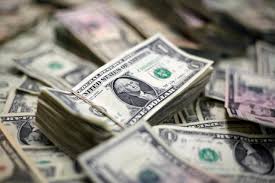Dollar ascendant; sterling slumps on lower rate expectations, bleak outlook

The dollar looked set to post its best week in over a month on Friday on expectations that U.S. rates could peak higher, while sterling was on the ropes as investors revised their rate projections after a shift in tone from the Bank of England.
Sterling
edged up 0.1% to $1.1170, after sliding 2% overnight. It was headed for a weekly loss of nearly 4%, the largest since September’s market turmoil triggered by an economic plan that alarmed investors.
While the BOE raised interest rates by the most since 1989 on Thursday, it warned investors that the risk of Britain’s longest recession in at least a century means borrowing costs are likely to rise less than they expect.
“Sterling is getting a dose of the reality of the economy. That the Bank of England has to make – surely to the fiscal side – tough choices,” said Rodrigo Catril, a currency strategist at National Australia Bank.
“It’s been sort of coming for some time that the Bank of England is a reluctant hiker … in the current environment. But certainly, those inflation numbers are still way too high.”
Euro was up 0.08% at $0.97575, after falling close to 0.7% overnight, while the kiwi fell 0.06% to $0.5772, having similarly slid 0.7% in the previous session.
The U.S. dollar index
, which measures the greenback against a basket of currencies, firmed to 112.90, after surging 0.8% overnight and touching a roughly two-week high of 113.15.
The index was on track for a weekly gain of 2%, its largest since September.
While the Federal Reserve raised interest rates by three-quarters of a percentage point this week and signaled that it may be nearing an inflection point in its aggressive monetary policy tightening campaign, Fed Chair Jerome Powell was quick to dampen hopes of a potential pivot, adding that it was “very premature” to discuss when the Fed might pause its increases.
Fed rate futures now point to a terminal rate of about 5.15% by June, with U.S. Treasury yields moving in step with the higher expectations.
The two-year Treasury yield
, which typically moves in step with interest rate expectations, last stood at 4.7243%, after hitting a 15-year peak of 4.745% the previous session.
“Overall, the dollar has economic and central bank relativities on its side, and for now, it’s sort of the realization that [a] pivot is not really coming in, it’s just a downshift in terms of gears,” said Catril.
Markets now shift their focus to key U.S. jobs data due later on Friday, with economists polled by Reuters expecting nonfarm payrolls to have increased by 200,000 jobs in October.
Elsewhere, the Japanese yen
rose a marginal 0.07% to 148.155 per dollar, while the Aussie
fell 0.02% to $0.6287, following a nearly 1% overnight fall.
The Reserve Bank of Australia on Friday downgraded the outlook for economic growth, warning that more rate hikes will be necessary to bring down sky-high inflation even as it strives to avoid an outright recession.

